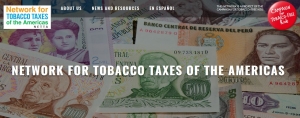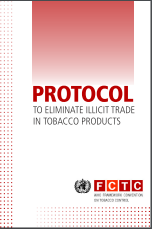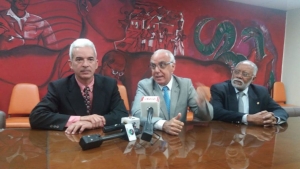Confronting Illicit Tobacco Trade: A Global Review of Country Experiences
February 1, 2019
The World Bank has released a report on “Confronting Illicit Tobacco Trade: A Global Review of Country Experiences”. The report demonstrates that reducing illicit trade in tobacco products is critical whether viewed from the perspective of public health, public finance, governance, or equity.
This publication presents country and regional case studies, covering over 30 countries, including:
– Organization of Eastern Caribbean States (OECS) and Trinidad and Tobago: Regional Reports on Illicit Tobacco Trade
– Chile: Tackling the Illicit Tobacco Trade
– Colombia: Illicit Cigarette Trade
– Ecuador: Addressing Illicit Tobacco Trade
– Mexico: Controlling the Illicit Cigarette Trade
– Uruguay: Tackling Illicit Tobacco Trade
Read the report at: https://www.worldbank.org/en/topic/tobacco/publication/confronting-illicit-tobacco-trade-a-global-review-of-country-experiences
Tobacco Tax Network of the Americas (RITA)
October 31, 2018

The official website of the Tobacco Tax Network of the Americas (RITA) is available, a space to share information on tobacco tax issues in our region. We invite you to browse it here: https://www.tobaccofreekids.org/rita
It is a public web page where you will find the most relevant bibliography on the subject, the latest news about taxes, interviews with experts in fiscal policy and other relevant information to promote this measure in our countries.
The page also has direct access to the forum of the virtual network of RITA, of which several of you are part. It is important to clarify that this virtual forum (unlike the new site) is still closed only to its members and is an important space to share information that is not necessarily of a public nature.
<align=”justify”></align=”justify”>
Entry into Force of the Protocol to Eliminate Illicit Trade in Tobacco Product

On 27 June 2018, the conditions for the entry into force of the Protocol to Eliminate Illicit Trade in Tobacco Products were met with the ratification of the United Kingdom of Great Britain and Northern Ireland. As such, the required 40 Parties to the Protocol was reached, for its entry into force on September 25, 2018. This achievement is a milestone in the history of tobacco control internationally.
#QuitBigTobacco
During the World Conference on Tobacco or Health in Cape Town, Vital Strategies launched a global campaign to separate the tobacco industry from its associates that make their work possible, especially advertising agencies.

We call on non-profit organizations and companies with a health mission to commit to not working with the tobacco industry or advertising agencies that help and encourage the industry’s effort to engage a new generation of tobacco users. You can make your promise here.
Tobacco claims more than 7 million lives each year. The tobacco industry uses aggressive marketing to engage young people and turn them into lifelong smokers; Advertising is the vector for the death and misery that tobacco causes.
Some organizations and their advertising agencies have decided not to work with the tobacco industry, but others continue to do so. Some advertising agencies have clients from the tobacco industry while, at the same time, working with organizations focused on health. For example, the global Marlboro campaign “Do not Be a Maybe” is the work of Leo Burnett, the same advertising agency behind recent announcements by United Healthcare, a leading health insurance company that may not be aware of the situation. This is an unacceptable contradiction.
#QuitBigTobacco draws attention to advertising agencies with these conflicts of interest. We are asking nonprofit companies and organizations focused on health, and you, our colleagues and friends, to advocate for health by refusing to work with suppliers that have ties to the tobacco industry.
We encourage all health-related organizations to verify that their current providers do not work with the tobacco industry. They might consider including a conflict of interest clause in their standard provider contracts, if they do not already have one. This will prevent agencies from working with the tobacco industry while working with our organizations. This action also sends a strong message that we will not spend money on suppliers that do not share the values of our organizations.
For more information contact: supportus@quitbigtobacco.org. To follow the campaign visit: https://twitter.com/QuitBigTobacco.
CTFK Plain Packaging Toolkit
A practical guide to policy development, drafting the law and overcoming tobacco industry opposition.
 El empaquetado neutro de tabaco es una política de sentido común que elimina las características de promoción, marketing y publicidad en los paquetes de tabaco, pero deja las advertencias sanitarias, los sellos fiscales y otras características requeridas por el gobierno.
El empaquetado neutro de tabaco es una política de sentido común que elimina las características de promoción, marketing y publicidad en los paquetes de tabaco, pero deja las advertencias sanitarias, los sellos fiscales y otras características requeridas por el gobierno.
Most governments have increased the size of the health warnings at the same time as introducing plain packaging. The main elements of a plain packaging of tobacco policy are:
- Packaging must be a uniform, plain, unattractive color -usually a dull brown/green;
- All packs must be a standard shape, size and texture, and be made from cardboard;
- No branding, logos or other promotional elements can appear on the packaging – or on individual cigarette sticks;
- The brand and product name can appear on each pack, as well as the quantity of product in the pack and manufacturer’s contact details, but in a standard size, color and typeface.
- Health warnings, tax stamps and other government requirements remain on the packs.
Download the CTFK Plain Packaging Toolkit at: https://www.tobaccofreekids.org/plainpackaging/guides/download-toolkit
The Dominican Republic demands 100% smoke free environments
One quarter of deaths due to second-hand smoke are in children.
 The Dominican Foundation for Obesity and Cardiovascular Prevention (FUNDO) and its Dominican Anti-tobacco Alliance (ADAT) demanded today that the Dominican Republic have 100% smoke-free environments as a way to fulfill the right of non-smokers to breathe clean air free of contamination.
The Dominican Foundation for Obesity and Cardiovascular Prevention (FUNDO) and its Dominican Anti-tobacco Alliance (ADAT) demanded today that the Dominican Republic have 100% smoke-free environments as a way to fulfill the right of non-smokers to breathe clean air free of contamination.
Dr. Samuel Ramos, vice president of FUNDO, explained that every year tobacco kills more than 7 million people around the world, of which around 900,000 have never smoked but have been exposed to second-hand smoke. Worse still, a quarter of those killed by second-hand smoke are children.
In regard to our country, annually more than 6,410 people are killed by diseases caused by tobacco. More than 11,100 children and more than 871,000 adults continue to use tobacco every day.
Read the complete report in Spanish: http://eldia.com.do/demandan-ambientes-100-libres-de-humo-de-tabaco-en-rd/
WHO Report on the Global Tobacco Epidemic 2017

The “WHO report on the global tobacco epidemic 2017 tracks the status of the tobacco epidemic and interventions to combat it. The report focuses on monitoring tobacco use and prevention policies and includes in-depth analyses of monitoring capacity of WHO Member States, allowing a detailed understanding of progress and future challenges in this area.
